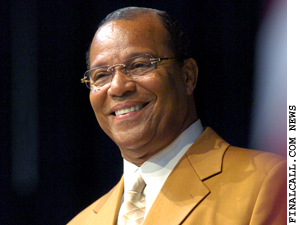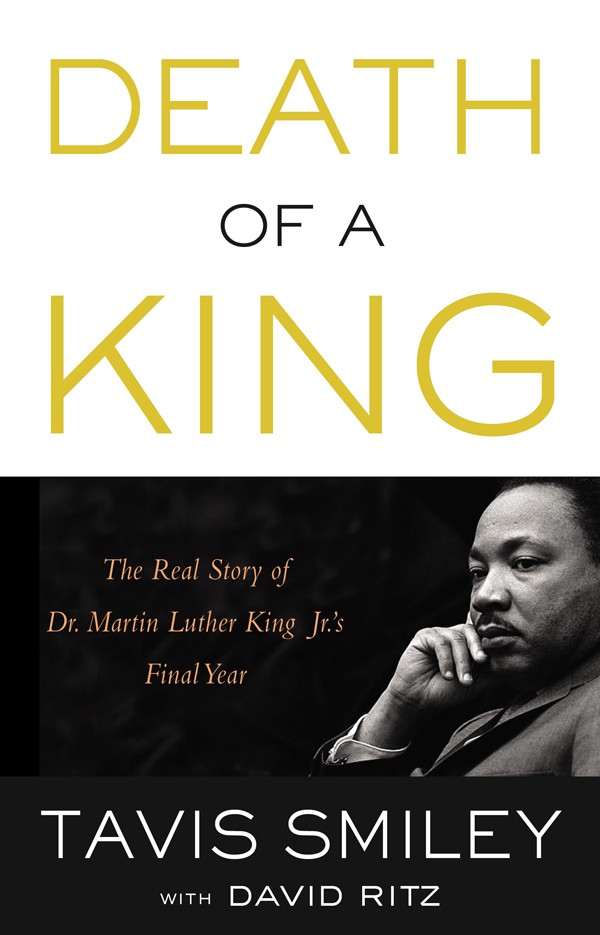Minister Farrakhan and Dr. King by Jackie Muhammad-NOI Research Group
 The Honorable Minister Louis Farrakhan has pointed out repeatedly that the enemy of our people has modified the image of Dr. Martin Luther King. After his death his image was sanitized. Tavis Smiley says he was demonized while he lived and deified after they murdered him. He was made to appear to be someone other than who he really was, especially during the last year of his life. Tavis designates him a social revolutionary.
The Honorable Minister Louis Farrakhan has pointed out repeatedly that the enemy of our people has modified the image of Dr. Martin Luther King. After his death his image was sanitized. Tavis Smiley says he was demonized while he lived and deified after they murdered him. He was made to appear to be someone other than who he really was, especially during the last year of his life. Tavis designates him a social revolutionary.
Brother Tavis has written a book in which he focuses on the last year of Dr. King’s life. Surprisingly, many of Dr. King’s positions are parallel to many of the conclusions Minister Farrakhan has also drawn. They include: the uselessness of many Black politicians; his rebuke and admonishment of many preachers; America’s rendezvous with hell; his condemnation of Israel; his conflict with the Jews; his support of the youth, and his meeting with the “gang” members; the condemnation of America’s war efforts; the impact slavery has had on the black man (he said 75 million of our people were murdered and died as a result of our enslavement); and America is the world’s leading war criminal, etc.
According to one of Tavis Smiley’s latest books, Death of a King: The Real Story of Dr. Martin Luther King Jr.’s Final Year, America crucified Dr. King in the last year of his life; America made him a pariah. He was despised and rejected by the government and the private sector, especially the media, partially because he had denounced the government for the war in Vietnam and America’s abandonment of the poor.
According to the last Harris Poll taken just before the murder of Dr. King, 75% of the American people had turned against him. More startling, almost 60% of his own people considered him irrelevant.
Tavis revealed in an appearance on the John Stewart’s Comedy Central program last year that the last speech Dr. King was preparing was called “Why America May go to Hell”. However, in some of Dr. King’s discussions he did not use the word “may”. King used a more definitive language. He said, “America will go to hell”. He said, “If America doesn’t use its vast resources and wealth to bridge the gap between the rich and poor nations, and between the rich and poor in this nation, it too is going to hell”
 Then he says specifically, “We (America) have committed more war crimes almost than any nation in the world”. He added to that, “When poor people and Negroes are way down in a depression situation economically, we call it a social ill, but when white people get massively unemployed we call it a depression. And the Negro is facing a depression….When you get to the Negro youth, the unemployment is probably in some cities between 30% and 40%. Now this is a depression more staggering than the depression of the 30s”.
Then he says specifically, “We (America) have committed more war crimes almost than any nation in the world”. He added to that, “When poor people and Negroes are way down in a depression situation economically, we call it a social ill, but when white people get massively unemployed we call it a depression. And the Negro is facing a depression….When you get to the Negro youth, the unemployment is probably in some cities between 30% and 40%. Now this is a depression more staggering than the depression of the 30s”.
His response to President Johnson’s National Advisory Commission on Civil Disorders (the Kerner Commission) was to point out that the root cause of the riots was unequivocally “White racism”. Further, he states, “The Commission’s finding that America is a racist society is the root cause of today’s urban disorders is an important confession of a harsh truth“. “A riot is the language of the unheard,” he said. “What is it that America has failed to hear? It has failed to hear that the plight of the poor has worsened over the last few years. It has failed to hear that promises of freedom and democracy have not been met. It has failed to hear large segments of society are more concerned about tranquility and the status quo than justice and humanity”.
King identified with the youth, he did not shun them. “What I cannot get across to these young people is that I wholly embrace everything they feel. It’s just the tactics we can’t agree on. I have more in common with these young people than with anybody else in the movement. I feel their rage, I feel their pain. I feel their frustration. It’s the system that’s the problem, and it’s choking us to death”.
Speaking to a close Jewish associate, Dr. King said, “Martin Luther King is dead”. “He’s finished. His nonviolence is nothing, no one is listening to it. Let’s face it, we do have a great public relations setback where my image and my leadership are concerned”.
Smiley reports that King laid out a plan to end unemployment “totally and immediately” in America. “If our government cannot create jobs, it cannot govern. It cannot have white affluence amid black poverty and have racial harmony. Tavis continues by quoting King as follows: “The turmoil of the ghetto is the externalization of the Negro’s inner torment and rage”.
Smiley does not specify what Dr. King’s jobs creation plan entailed. There are no specifics. However, further research shows that King called for a form of democratic socialism that was designed to bring about a “better distribution of wealth” that resulted in the nation “undergoing a radical redistribution of economic power”. Further, in an article written by Mark Engler in The Nation magazine, we learn that Dr. King admonished the government to create a “massive Federal Public works program to provide jobs for all the unemployed”.
Dr. King criticized President Johnson’s War on Poverty as being too piecemeal and fragmented. He agreed with President Johnson that housing programs, job training and family counseling were all necessary. However, he viewed them as being too fragmented. He saw them as components of a strong jobs creation program that integrated the fragmented components into a composite whole. The finances to undergird such an approach would come from the monies being wasted in the Vietnam War.
According to Engler, King based his theories on the works of Thomas Paine, prominent economists like Kenneth Galbraith, social activists like Bayard Rustin, and the writings of the Apostle Paul. The net result would be a “$30 billion annual investment in antipoverty measures, a government commitment to full employment, enactment of a guaranteed income and funding for the construction of 500,000 affordable housing units per year”.
This was an aspect of his thinking he had planned to take to Washington. The Honorable Minister Louis Farrakhan plans to deliver the speech Dr. King was prevented from giving to the nation.
Jackie Muhammad is a member of the Honorable Minister Louis Farrakhan’s Research Team and can be reached at [email protected]
